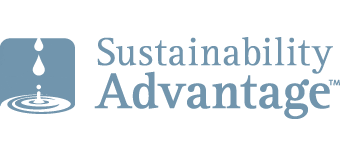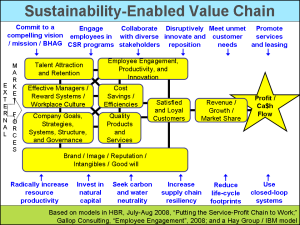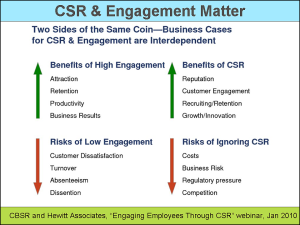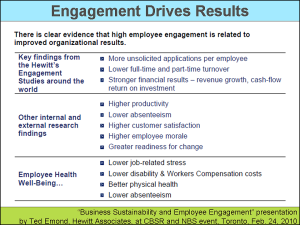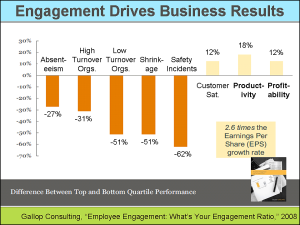CSR Efforts and Employee Engagement Drive Business Results

Wouldn’t it be great if we could show that companies which embrace corporate social responsibility (CSR) reap financial rewards? Sustainability champions armed with this information would be welcomed by business leaders seeking new ways to get the most from their companies’ resources and efforts. Fortunately, the links between CSR efforts, employee engagement, and business results are becoming clearer.
In last week’s September 28, 2010, blog, we pieced together a sustainability-enabled business value chain. A version of it is in the adjacent slide. It shows that there is a pattern of connections among key tangible and intangible pieces of the business model puzzle that lead to the most important piece—profit and free cash flow.
It also shows that sustainability-related strategies like those around the perimeter strengthen the links in the chain and support the generic business model in the middle, described in my September 21, 2010, blog.
This week, we’ll review two studies that show how one of those sustainability-related strategies at the top of the slide—Engage employees in CSR programs—strengthens the “Employee Engagement, Productivity, and Innovation” link in the value chain.
The Hewitt / CBSR studyIn 2009, Hewitt Associates partnered with Canadian Business for Social Responsibility (CBSR) to study the relationships between companies’ CSR efforts, employee engagement, and other business factors. Building on findings from Hewitt Associates’ Best Employers in Canada studies, Hewitt and CBSR gathered opinions from over 100,000 employees and 2,000 leaders at more than 230 workplaces.
They found that the benefits of CSR efforts and the benefits of high employee engagement are complementary and interdependent, as shown in the above slide.
The business benefits echo the links in the sustainability-enabled value chain slide, above. Note that the findings include the risks to various links in the value chain of not capitalizing on high engagement and CSR efforts, as well as the benefits from doing so. The adjacent slide summarizes their finding that “there is clear evidence that high employee engagement is related to improved organizational results.”
Gallup Consulting study
Another study by Gallup Consulting of data from over 125 organizations builds on the idea of comparing the upside of having an engaged workforce with the downside of having a disengaged workforce. Gallup compared the performance of companies in the top quartile of engaged employees with the performance of companies in the bottom quartile of (dis)engaged employees.
There was a dramatic difference between the top and bottom quartile companies track records in safety incidents, employee turnover, and absenteeism. More importantly, Gallup has proven that companies with highly engaged workgroups have 18% greater productivity, 12% higher profitability, and 2.6 times the earnings per share (EPS) growth rate compared to organizations with lower engagement in their same industry. Wow!
Do companies want lower absenteeism, lower employee turnover, and fewer safety incidents? Yes. Do they want higher customer satisfaction, higher employee productivity, greater profitability, and faster EPS growth? You bet. If these benefits come from more engaged employees, and if CSR efforts contribute to that higher level of engagement, then companies wanting to be successful would be well advised to focus more on meaningful, impactful CSR efforts. We’ll explore the exciting linkage between CSR efforts and employee engagement more next week.
Bob
The PowerPoint slides used above are from my Master Slide Set.
Please feel free to add your comments and questions using the Comment link below.
